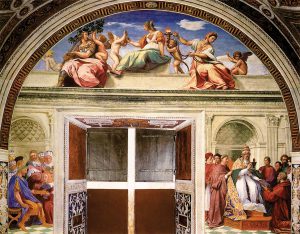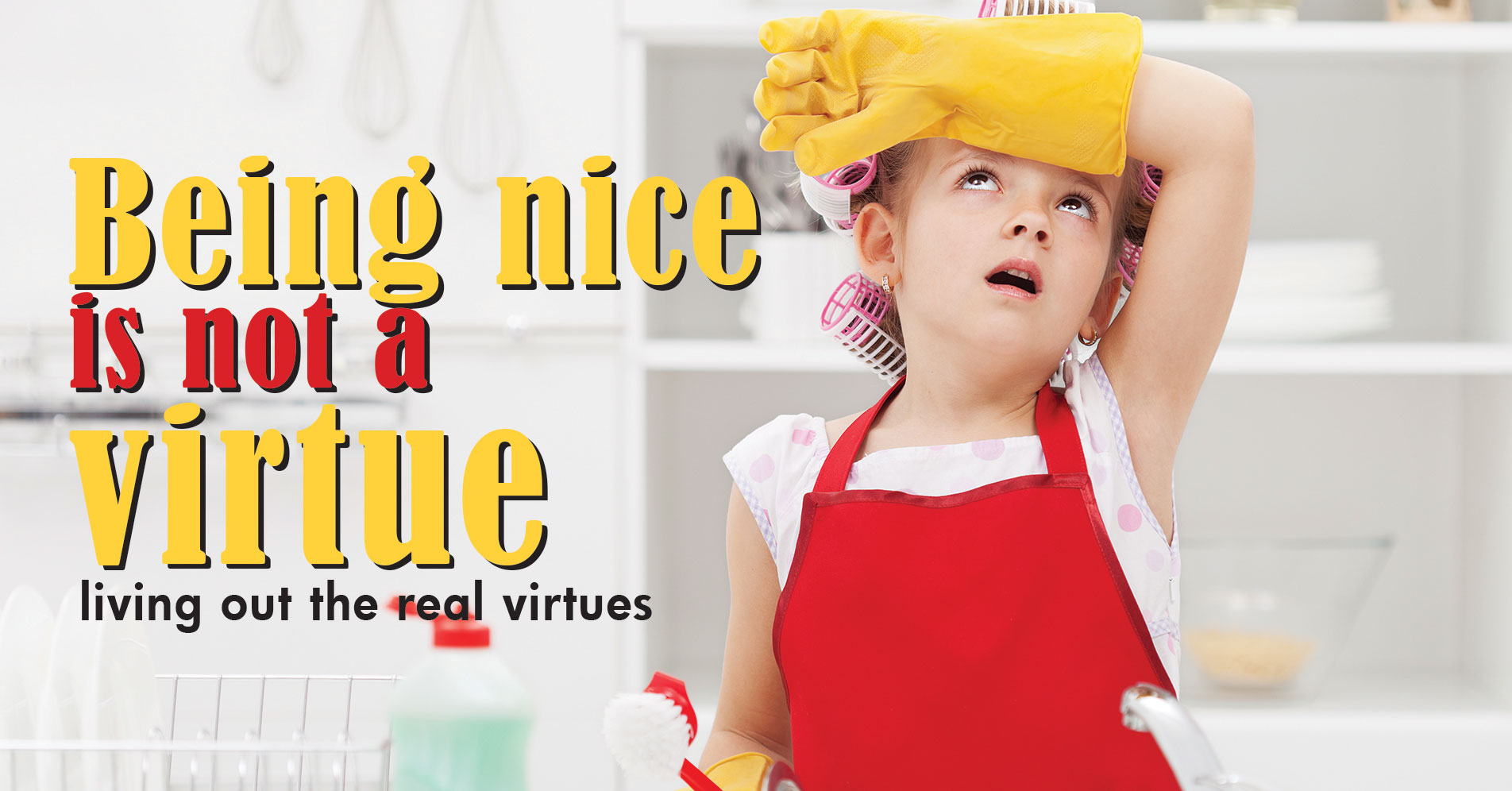
“She is such a nice person.”
“He was very nice to me.”
We are often grateful when someone treats us or someone we care about well. It’s pleasant. It’s nice.
But as much as we might hear about “South Dakota nice” – meaning we act kindly to friend and stranger alike, there is something only surface deep about that.
“My students often seem a bit shocked when I tell them that being nice isn’t the essential part of living a Christian life,” said Patricia Irvine, chair of the Theology department at O’Gorman High School in Sioux Falls.
“I point to the life of Christ as proof that niceness isn’t our main goal,” she said. “The life, death, and resurrection of Jesus weren’t centered on being nice to others. Rather, He calls us into deeper relationship with Himself and grants all the graces necessary to become saints.”
Joe Rutten leads the Benedictine Leadership Institute at Mount Marty College in Yankton, as well as the Catholic Men’s Business Fraternity, both of which spend considerable focus on the promotion of virtue.
“Classical virtue ethics certainly didn’t have niceness on the list although our modern world has adopted it as one,” Rutten said.
“We live in a culture of moralistic therapeutic deism which is the religion of niceness, whereby we care more about how people feel versus whether they are actually good.
“I would say that the Catholic moral tradition would probably look at the virtue of justice or charity as the virtue to qualify someone’s behavior as being morally good toward another,” he said.
Fr. Andrew Dickinson, director of the Pius XII Newman Center at South Dakota State University in Brookings, points out that the background of the word nice gives some clues to the problems of how it is commonly used today.
“While ‘being nice’ is a societal norm today, nice is not a virtue because it is not an interior habit of choosing the good,” Fr. Dickinson said.
“Even as we laud and compliment people as ‘being nice’, we acknowledge that nice can be a cover for evil intentions. We can even say evil things in a pleasing manner. We can seem fair but be foul.
“The history of the word nice is rooted in the Middle English word for ‘stupid’ or ‘foolish’. And from the Latin word: ‘nescious’ for ignorant and incapable. While meanings change, still today someone who is nice is someone ‘safe to my status quo’ with little reference to actual good or evil,” he said.
That thought is echoed by Robert Schuchardt, vice president for student affairs at Presentation College in Aberdeen.
“Being nice is not a virtue because being nice is a superficial interaction with someone based on a selfish need to please ourselves or be perceived by others as being a nice person,” he said.
“Being nice is not wrong, just not a virtue. I think sometimes being nice is confused with being kind. Being kind can be an act of love or charity and is conducted for the relief or betterment of the recipient without concern about how others view why you are doing it (you don’t care how other people see it).”
If being nice is not a virtue, what are the real virtues?
“Real virtues are interior habits of the soul that are good habits,” said Fr. Dickinson.
“We are familiar with the power of habit- whether it is in personal care, or work, but it also applies to prayer. I see this impact my college students all the time- they seek to build up a prayer life, and it goes well in college because it is supported by a Newman Center, by peer relationships, and good access to the Sacraments. When they go home for Christmas or summer break, they lose the support and find that the habit of prayer is not as refined or stable as they thought- it is not yet a full habit or virtue,” he said.
“Cardinal virtues can be deepened through our active choices and through education. Theological virtues are infused into our souls by God,” noted Irvine.

“Pursuing virtue, either through active practice or petition, means setting aside our own plans and seeking the Lord’s plan for our lives.
“Prudence is an example of a real virtue. It uses our reason and intellect to discern our true good in every circumstance and chooses proper means to arrive at that good. It isn’t, however, about simply knowing the good, but rather about doing the good, about living the good,” Irvine said.
“In pursuing the good, we are truly pursuing freedom. The grace that God pours out upon us gives us the freedom to live as sons and daughters of the Living God.
“When we embrace vice instead of virtue, we are choosing to become slaves when Christ died to set us free. As we repeatedly choose virtue, especially when faced with difficult situations, we will more naturally respond in virtuous ways. What at first was a struggle to choose, will become second nature as we embrace the freedom found in virtue,” she said.
This notion of habit forming virtue, of virtue leading to freedom and happiness is an ancient one.
“From a very human standpoint, the great philosopher Aristotle would tell us that it is in the virtuous life that happiness is attained,” Rutten said.
“If you want to be happy, live virtuously. Second, because the goal of the virtuous life is human excellence or perfection and this is the path to God. Third, to live contrary is to be filled with vice, to live like an animal, and this is not the object for which the human person was created. We were created for nobility, for the greatest, for more than this world and the life of virtue helps us attain that God-like state,” he said.
Lest you think this is a philosophical or theological conversation beyond you, there are plenty of practical applications for everyday life.
Rutten says to think about the chores we all have. Chores?
“Yes, chores. First, being virtuous isn’t simply about what a person does but also about their attitude and disposition – maybe when we think about doing the dishes. We know that kids doing chores or for that matter – any of us – how many of us like to do the dishes or the laundry?
“The virtuous person isn’t simply the person that gets the chores done, but does it with an attitude and disposition of excellence as well. Even as an adult we can lack the proper attitude while doing chores but certainly this is what we train up our children to do, complete the tasks well but also to do so without complaining and whining,” Rutten said.
When Aberdeen St. Mary member and Roncalli High School senior Austin Kokales was completing his Eagle Scout project a practical dilemma presented itself which illustrates the power of habit, choice and virtue.

Kokales’ project was construction and installation of a little library for Aberdeen Simmons Middle School.
“I built what looks like a giant birdhouse and it is filled with books that young children can check out over the year if they live too far away from a library.
“The night I had planned to go watch football with my friends I had knew I had to work on my project to stay ahead of the work,” Kokales said.
“At first, I was going to not do my project. Then I remembered all the children that would love to check out books and the only way they could do that is if I finished my free little libraries and when I looked down at my wrist on my way out the door I decided to stay home and work on my project,” he said.
The habit of wearing on his wrist the “what would Jesus do” band – started when he was in the 5th grade – helped him make the virtuous choice to finish the project.
“A great analogy for virtue is athletic competition,” Fr. Dickinson said. “There is a phrase you’ll see on shirts in gyms: ‘hard work beats talent when talent doesn’t work hard.’ This expresses an understanding of the virtues.
“When we forget about virtues we lose track of how we grow into the habits of the heart of Jesus. Most Catholics admit that they WANT to be holy, but don’t know how they become holy. How do I get from here to there? The virtues show us a
path of holiness,” he said.
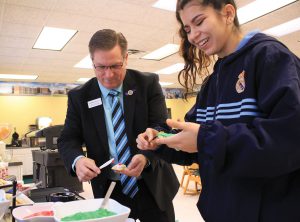
Schuchardt offers another practical example of making a virtuous choice.
“Say you find yourself at a tight budget spot at the end of the month. You pull out a shopping cart at the store, look down, and find a wallet. You look inside the wallet and see that it belongs to someone that lives way across town and it contains several hundred dollars.
“You can keep the money and no one would be wiser as no one saw you find the wallet or you can return it to the individual whose ID you found inside the wallet. This is where our life choices come to a head. The choices you make define you as virtuous or not,” he said.
Doing the right thing, whether anyone else knows or not, suggests that being virtuous is as much about our relationship with God as it is with each other. But it is with each other where we actually live out that relationship with God and make a difference in the lives of others.
“We really don’t speak directly about the Catholic virtues to students and parents, but I will say that the virtues are demonstrated, as much as humanly possible, at Presentation College by the way we live, work, and serve each other,” Schuchardt said.
“We are by no means perfect, but we always try to do the right thing for those in and around our college community.
“I am seeing that today’s students have a good heart but are still trying to find their way. I think that the potential for remarkable things exists within our students and through the grace of God we will educate them to not only be successful in their chosen career path, but on the life path that God has set out before them,” he said.
“Long term, I pray our students will take their curriculum based education, coupled with their co-curriculum based knowledge and education, in all aspects of faith to the communities in which they live and demonstrate the virtuous life,” Schuchardt said.
“This example could and should be a positive influence on their family, career, and community. If we are successful, and it is God’s will, their example may lead others to live a virtuous life as well.”
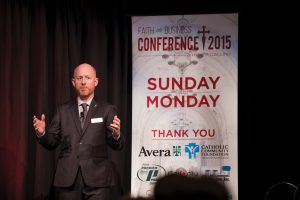
At Mount Marty, Rutten said “The Benedictine Leadership Institute is integrating virtue ethics into its curriculum and forming young leaders personally and professionally in the life of virtue.
“The heart of the college experience will be inspiring college students to live the great life and that’s a life of virtue. The college will examine ways virtue is found through the college experience outside the classroom as well.
“People might expect areas like campus ministry to be places of collaboration, but we are also going to work closely with areas like athletics, as athletic director Chris Kassin, coaches and I consider how virtue is found in the life of our student athletes,” Rutten said.
Long-term, forming students in virtue has significant impact not only for the students, but for the communities and jobs of their future.
“We believe that now as much as ever, employers will desire to hire students that are professionally competent, but will also place high value on their virtue. We will graduate students that are formed in those habits of excellence we call virtues, and it will be those graduates that employers will value because they are trustworthy and do the right thing,” he said.
At the same time, the work of the Catholic Men’s Business Fraternity (CMBF) is aimed at least in part towards students finding employers who are also living the virtues.
“CMBF chose to have the virtues stand as our apostolate’s values because we see the necessity of the virtuous life as the means to living the good life and the source of regulation for the ethics of business,” Rutten said.
“Business does a great amount of good for communities and it is when the people in business are virtuous that the businesses they run are truly good and truly serve. When business leaders are not virtuous then it allows greed to become the habit of mind and will that drives the company and then the business will fail to be good and serve,” he said.
When is the right time to live out the virtues? Irvine said the answer is now.
“The present moment is very important. What we do now with our lives impacts the people we will be in five or ten years. My small, daily choices and actions form my heart and my will,” she said.
“St. Maximilian Kolbe, a priest in the Auschwitz concentration camp, made the heroic decision to give his life for a stranger. That gift of self would not have been possible if he had not pursued virtue in the small and mundane events of daily life. The same is true for us. If virtue is the habitual disposition to do the good that means we must strive to daily choose the greater good, even if it pains us.
“Athletes push themselves and strain to reach the goal, sacrificing what is unnecessary in order to be victorious. As runners in the race to Heaven, we must also train and sacrifice for the end goal.
“Yet not only with the end goal in mind – Jesus did not come and encourage us to be miserable until we reach Heaven. He said we needed to pick up our cross to follow Him, but He also said that He wanted to give us abundant life. The virtues are the way we live this abundant life,” Irvine said.
Kokales is hopeful that his age group can use the virtues to make a difference.
“I feel our generation notices problems in society and is trying to change them. They may not all be good but at least we are trying to change things rather than just let things get worse,” he said.
“Students who embrace virtues become vocations (priestly, religious, and married) who embrace vocations. They will be a bed-rock in parishes,” said Fr. Dickinson.
“The more we are removed from virtues as a society, the more society will depend on parishes and societies having people who deliberately cultivate virtues.”
Back to being nice – is there a problem with being nice?
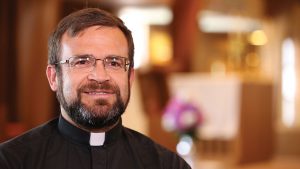
“The choice is not between being nice and being mean, but about being good,” said Fr. Dickinson.
“Being nice is fine but incomplete. Being nice also focuses on external appearances- how did I appear to others? Being nice keeps me beholden to others. Seeking virtue and goodness keep us directed towards God, the source of goodness and judge of souls. So being nice can lead us to be enslaved to others’ opinions while, on the other hand, seeking virtue brings freedom,” he said.
Rutten said, “We know what people are trying to say when they use the word nice, but it is a good thing for us to consider, what is it that God is calling us to do? Is he calling us to be nice? I don’t think so.
“Is he calling us to be just, kind, charitable? Absolutely, and if we develop those habits of excellence in justice, kindness, and charity, then we will live a fulfilled life, and eventually become like God and ultimately join him eternally in the blessed life.”
Irvine reminds us that virtuous people are free people.
“In Mere Christianity, C.S. Lewis said, ‘How monotonously alike all the great tyrants and conquerors have been; how gloriously different are the saints.’
“The saints stand out by their virtue, while the vice of all the ‘great men of the world’ blends together,” she said.
“If we desire to be beacons of hope and movements of change in our schools and communities, we must be willing to sacrifice in the present to pursue lifelong virtue. Many of the problems we see in our world today are the result of a culture that focuses on themselves and doing things their own way.
“The antidote to violence, greed, poverty, despair, and hatred is a genuine, wholehearted pursuit of the virtues–starting with me.”


